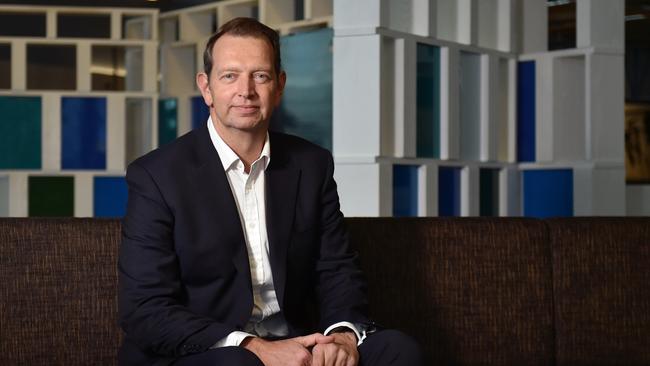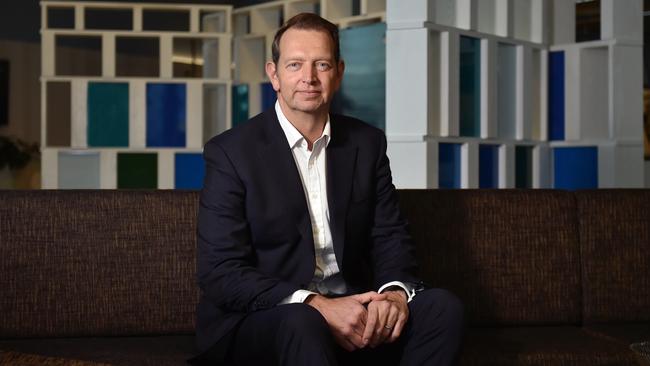Medibank says it will grow in line with the market as resident policy growth slips
The ASX-listed insurer says Australia lags global peers in the ‘health transition’ away from acute care, as it delivered a profit in line with expectations.

Medibank Private missed its target for resident policyholder growth in what the company said was a challenging and competitive market for health insurers, and flagged it would “remain disciplined’’ in chasing growth this year.
Managing director David Koczkar says consumers were facing cost of living pressures, however the well publicised issues within the public health sector meant private health insurance remained attractive.
“I think the fundamentals are very strong notwithstanding the pressures on the consumer,’’ he said on Thursday.
Medibank reported a full year net profit of $492.5m, up nearly 60 per cent, on revenue of $7.85bn, up 8.1 per cent.
Underlying profit was up 14 per cent to $570.4m, in line with consensus estimates.
Medibank’s core insurance business experienced a fall in net resident policyholders of 3400, or 0.2 per cent, while ahm added 17,800, or 3.4 per cent.
Non-resident policyholders jumped by more than 25 per cent, or 69,000.

“The competitive environment continued with customers focused on price and value given cost of living pressures,” Medibank said.
“This led to a modest increase in the level of customers switching funds and lapsing.
“Medibank’s acquisition rate was back in line with pre-2022 cybercrime event levels while
ahm’s acquisition rate increased strongly.’’
Mr Koczkar said the net increase of resident policyholders of 14,400 missed the company’s goal.
“While this is not what we set out to achieve, given the competitive market we remained disciplined about the best way to grow for the long term,’’ he said.
“Momentum continued in our nonresident business, with net policy units up 69,000 or 25.1 per cent.
“Standout growth in the student market reflects our strong university relationships – with Medibank the preferred provider of overseas student health cover for nearly half of Australian universities.’’
The net resident policy growth of 0.7 per cent missed guidance of 1.2-1.5 per cent, UBS said.
“Non-residential revenues and gross margins look solid and ahead of expectations,” the broker said.
“Health divisional profit also well ahead of UBS and consensus. All up, we think market concerns for claims and margins appear overstated, partly offset by some near term caution around resident policy growth.’’
Barrenjoey said, “Policyholder growth was lower than expectations, but this was more than offset by business mix and a higher gross margin’’.
Mr Koczkar said Medibank had paid out $63m in one off financial support for private hospitals over the past two years, and the sustainability of the under-pressure sector was vital to the ongoing functioning of the Australian health system.
Transitioning the overall health sector to be more focused on primary and non-acute care was vital, however, he said.
“We want the private hospital sector to be strong, which is why we continue to support our hospital partners and fund them through the health transition,’’ Mr Koczkar said.
“Over the last 2 years our one-off financial support for private hospitals has reached a substantial $63m.
“This is in addition to higher indexation in our contracts and additional incentives to accelerate the health transition by providing our customers with greater choice, better access and more value in their healthcare.
“What we continue to think about is how we support the sustainability of hospitals in a way that doesn’t push up premiums, making private healthcare unaffordable for customers.”

A federal inquiry into the private hospital sector is expected to be completed by the end of the month, with private hospitals pushing for higher payments from insurers.
Mr Koczkar said Australia was lagging in the “health transition’’ away from hospital-focused acute care.
“The challenges in healthcare are well known – waiting lists, ambulance ramping, delays to see a GP or specialist and a stretched workforce.
“These challenges are not specific to Australia. They are global trends, which are largely driven by changing demographics and more of us living with chronic conditions.
“We are currently over reliant on treatment in more expensive acute hospitals, rather than in other more fit for purpose settings.
“The health transition is advanced in other parts of the world, with Australia trailing many countries in the uptake of more contemporary models of care.’’
Mr Koczkar said Medibank delivered more than four million health interactions through its primary care network, helping ease pressure on acute care providers.
Medibank will pay a fully franked 9.4c dividend, up from 8.3c last year.
Medibank shares closed down 2.3 per cent at $3.83 each, in a slightly higher market on Thursday.





To join the conversation, please log in. Don't have an account? Register
Join the conversation, you are commenting as Logout